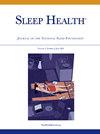Sleep health characteristics and positive mental health in Canadian youth: A cross-sectional analysis of the Health Behaviour in School-aged Children study
IF 3.4
2区 医学
Q2 CLINICAL NEUROLOGY
引用次数: 0
Abstract
Objectives
This study investigated the associations between specific sleep health characteristics and indicators of positive mental health among Canadian youth in grades 6-10.
Methods
We used cross-sectional data from the Canadian 2017/2018 Health Behaviour in School-aged Children study, a nationally representative sample of Canadian students. Our analyses included 14,868 participants (53.1% girls). We assessed the following self-reported characteristics of sleep health: nighttime insomnia symptoms, sleep duration, problems with daytime wakefulness, and weekend catch-up sleep. Positive mental health measures included self-reported life satisfaction, positive affect, self-efficacy, and self-confidence. Logistic regression models were used to assess associations while controlling for confounders.
Results
Participants who had no or little nighttime insomnia symptoms, who met sleep duration recommendations, who had no or rare daytime wakefulness problems, and who had no or little weekend catch-up sleep were more likely to report high life satisfaction (range of adjusted odds ratios = 1.29-2.50), high positive affect (range of adjusted odds ratios = 1.35-3.60), high self-efficacy (range of adjusted odds ratios = 1.22-2.54), and high self-confidence (range of adjusted odds ratios = 1.28-2.31). Almost all of the associations remained significant in the gender- and age-stratified analyses.
Conclusion
The findings suggest that good sleep health is associated with higher odds of positive mental health among Canadian youth in grades 6-10. Further research is needed to understand the temporality of the associations and the underlying mechanisms.
加拿大青少年的睡眠健康特征和积极的心理健康:学龄儿童健康行为研究的横截面分析。
研究目的本研究调查了加拿大 6-10 年级青少年特定睡眠健康特征与积极心理健康指标之间的关联:我们使用了加拿大2017/2018学龄儿童健康行为研究的横截面数据,这是一项具有全国代表性的加拿大学生样本。我们的分析包括 14868 名参与者(53.1% 为女生)。我们评估了以下自我报告的睡眠健康特征:夜间失眠症状、睡眠持续时间、白天觉醒问题和周末补觉。积极心理健康指标包括自我报告的生活满意度、积极情绪、自我效能感和自信心。在控制混杂因素的情况下,采用逻辑回归模型评估相关性:没有或很少有夜间失眠症状、符合睡眠时间建议、没有或很少有白天觉醒问题、没有或很少有周末补觉的参与者更有可能报告高生活满意度(调整后的几率比范围=1.29-2.50)、高积极情绪(调整后的几率比范围=1.35-3.60)、高自我效能感(调整后的几率比范围=1.22-2.54)和高自信心(调整后的几率比范围=1.28-2.31)。几乎所有的关联在性别和年龄分层分析中都保持显著:研究结果表明,在加拿大 6-10 年级的青少年中,良好的睡眠健康与较高的积极心理健康几率有关。要了解这些关联的时间性和内在机制,还需要进一步的研究。
本文章由计算机程序翻译,如有差异,请以英文原文为准。
求助全文
约1分钟内获得全文
求助全文
来源期刊

Sleep Health
CLINICAL NEUROLOGY-
CiteScore
6.30
自引率
9.80%
发文量
114
审稿时长
54 days
期刊介绍:
Sleep Health Journal of the National Sleep Foundation is a multidisciplinary journal that explores sleep''s role in population health and elucidates the social science perspective on sleep and health. Aligned with the National Sleep Foundation''s global authoritative, evidence-based voice for sleep health, the journal serves as the foremost publication for manuscripts that advance the sleep health of all members of society.The scope of the journal extends across diverse sleep-related fields, including anthropology, education, health services research, human development, international health, law, mental health, nursing, nutrition, psychology, public health, public policy, fatigue management, transportation, social work, and sociology. The journal welcomes original research articles, review articles, brief reports, special articles, letters to the editor, editorials, and commentaries.
 求助内容:
求助内容: 应助结果提醒方式:
应助结果提醒方式:


